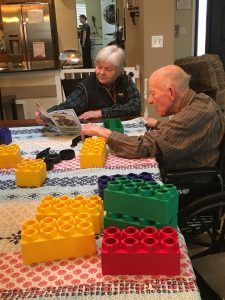

There are specific mental exams and physical testing in diagnosing dementia, but you must remember that the early stages of dementia can be so subtle that it may be 3 to 5 years before anyone notices significant changes in behavior.
Once these behavioral changes are noticed, it is important to accompany your loved one to their regular medical doctor immediately. It is impossible for a physician to make a clear and definitive diagnosis of the type of dementia a person has, until an autopsy is performed after the person’s death. The extent of damage to the brain and/or the protein abnormalities is not possible to accurately determine. That being said, there are some things to prepare to take to your first doctors’ visit to assist in providing all pertinent information to make diagnosing dementia easier.
- All medicines, supplements and over the counter drugs that are being used (include dosage, name and instructions indicated to take each drug).
- Note, in as much detail as possible, behavioral changes and health issues (past and present) and also any changes in the way your loved one performs a daily task.
- Personality changes and cognitive issues should also be noted and written down.
Doctors will first rule out any correctable conditions, as some types of dementia symptoms can be reversible if they are due to a brain tumor that is operable, a deficiency in vitamin B12, depression, alcoholism or a thyroid condition.

The first step to properly diagnosing dementia is to gather a medical history of the patient. This will include:
- Basic, general information (name, age, etc)
- Current medications
- Past and present health issues
- Types of diseases within your family (immediate and extended family members)
- Specific symptoms that originally brought you to their office in the first place.
Next would be a basic physical examination; blood pressure, height, weight, pulse, and respiration rate. An evaluation of the nervous system should also be done, including the brain, neurons and the spinal cord.
According the American Academy of Neurology, patients that are suspected having dementia should have the following tests:
- Blood cell count
- Potassium, sodium and chloride levels in the blood
- Blood sugar levels
- Vitamin B12 levels in the bloodstream
- Thyroid and liver functions
- Screening for depression.
Mental exams will include the doctor asking the patient to perform simple tasks and do some easy mental math. There is also the Mini Mental State Examination, which is designed to address several areas of mental wellness. These include the testing of:
- Orientation: Asking the patient what town they are in, who the current President is and what is the year and/or day.
- Retention/registration: Is the patient able to repeat the name of 3 objects in the room.
- Attention: Tested by asking the patient to count backwards or trying to come up with the correct answer to a simple mental math equation.
- Recall: Ask the patient to repeat the names of the 3 objects that were mentioned earlier.
- Language skills: Tested by asking the client to repeat phrases, naming some objects and having them answer simple questions.
- Motor skills: Tested by having the patient copy a simple picture or drawing…like the face of a clock with the numbers and hands set to a designated time.
Brain Scans are not effective in early stages of dementia, but these pictures of the brain are helping in diagnosing dementia in the later stages (especially if vascular dementia is suspected). These Scans include:
- CT (computerized tomography)
- MRI (magnetic resonance imaging)
- PET (positron emission tomography

After all the tests are completed and reviewed, the physician is ready to make a probable diagnosis of dementia (which means that if the results of all the tests match the criteria for a diagnosis of Alzheimer’s disease). The other option is that the doctor will make a possible diagnosis of dementia (which indicates that results demonstrate that the person has all the signs of dementia, but it may be different from typical Alzheimer’s disease or it is possibly caused by something other than Alzheimer’s.
Testing is not invasive or painful and it is imperative to see a physician as soon as possible to begin treatment as early as possible to ensure that the quality of time spent with family and friends and doing the activities that are loved are extended as long as possible.





